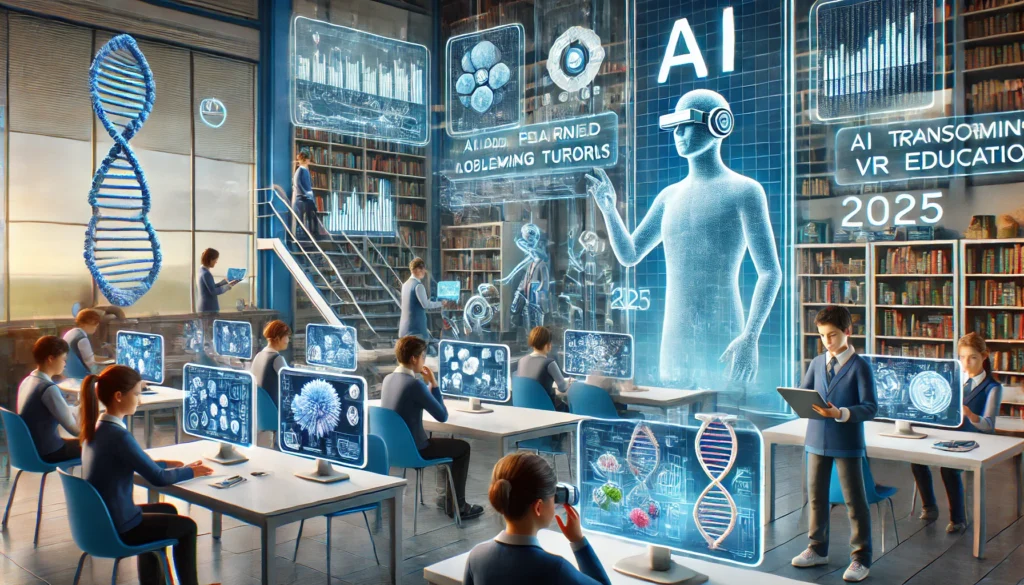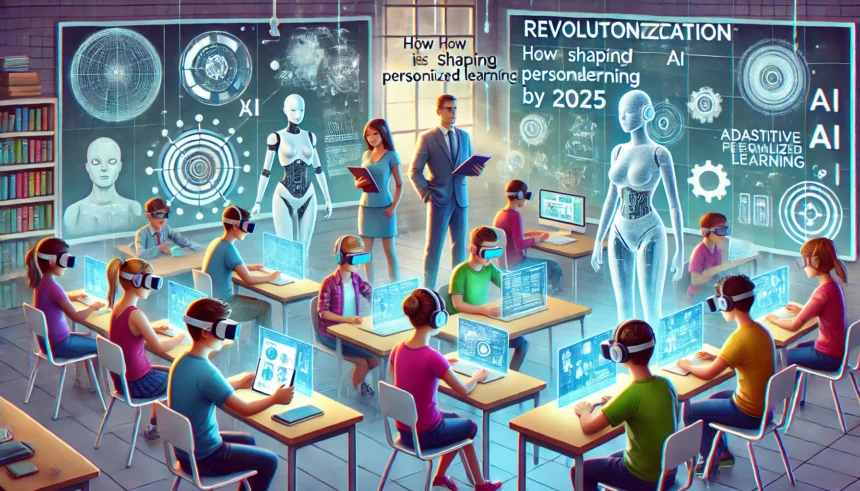Table of Contents :
- Introduction
- Maximum relevant advantages of AI tools for students
- customized getting to know AI: Shifts of Paradigms in training
- Use of AI technology in students for knowledge and strategies.
- Global & Indian Implementation and Success Stories Examples
- The AI Perspective on the Future of Education
- Professional Ethics in the Use of Artificial Intelligence in Education
- Effect of Using Artificial Intelligence
- Conclusion
Introduction
By the time we are almost in 2025 the aspects of Artificial Intelligence will bring about drastic change in educational methods that students use for learning. AI in students’ context helps organize lessons in ways that allow students to engage and identify their zones of proximal development. In light of the integration of personalized learning AI technology in education, data collection can help educators design proper and sufficient instructional credentials to cater to every learner. In addition, new forms of adaptive learning will improve the learning process since teaching materials will be adapted according to the individual learner’s requirements and should make education more open and inclusive.
Maximum relevant advantages of AI tools for students
Customized learning paths: The performance of AI makes it simpler to increase particular getting-to-know techniques that might be constructed particularly around a student’s learning abilities, weaknesses, and possibilities—in other words, it enables personalized
Real-time feedback: those equipment supply remarks on the assignments and checks as quickly as they’re finished with the aid of the students so students get to recognize their wrongdoings and misconceptions within the shortest time viable.
More advantageous Engagement: College students’ motivation is more advantageous through the incorporation of sports factors in AI tools, which might be used in tutorial training. This in turn should beautify their comprehension of the cloth on offer and, via extension, flip them into mere customers.
Help for various gaining knowledge of patterns: AI offers the means for addressing college students with different getting-to-know modalities, like the visual, auditory, or kinesthetic getting-to-know putting, and affords them with the resources that fall inside their type of studying.
Efficient, useful resource management: While grading and tracking scholar progress are mechanized, educators are left with greater time to exercise coaching and provide private attention to students, at the same time as college students, however, get hold of organized, clear interventions at appropriate periods.
customized getting to know AI: Shifts of Paradigms in training
Shift from One-size-fits-all: The conventional getting-to-know manner gives a prescriptive version of training that doesn’t meet the wishes of all novices. Intelligent tutoring systems assist in introducing the student-targeted method by delivering content and the use of techniques particular to the trouble-fixing pace and studying techniques of every learner.

Facts-driven Insights: AI structures take massive amounts of student statistics and hence identify trends in their performance and participation. Those are effective strategies of the statistics-pushed method that empower educators with full data about the development of the novices to layout and decorate teaching strategies that are high-quality and suit every student.
Improved scholar employer: personalized mastering AI has to do with presenting students with greater possession of learning approaches and therefore empowering college students. They could pick relevant subjects from the studying contents, determine the rate of learning, and use gaining knowledge of materials appropriate to their gaining knowledge of options.
More advantageous Engagement: using content that has been tailor-made in keeping with the scholar and their wishes, personalized learning AI increases their stage of engagement. Sophisticated and engaging sources help students to remain engaged, which makes mastering content material exciting and attractive.
Equitable gaining knowledge of opportunities: the usage of synthetic intelligence technology, providing knowledge of content to every individual scholar to meet his/her wishes, will become viable. An AI-driven method guarantees that each learner receives the right assistance, therefore selling equal possibilities in getting to know establishments.
The AI of personalized getting to know dramatically starts to alter the very paradigms of learning hitherto applied by professionals to the mastering process.
Use of AI technology in students for knowledge and strategies.
The advent of AI gear in scholar mastering has added dramatic modifications to the education quarter and remains converting. Here are five key factors highlighting their impact:
1. Personalization of learning
Consistent with sources, AI technology can customize studying to permit every scholar to attain a stage corresponding to their flair and intelligence. For instance, the ed-tech startup Khan Academy employs machine getting to know to help the program apprehend the studying modes of a pupil and then offers the pupil problems that he or she needs to solve primarily based on issue degree for effective gaining knowledge of as well as memory reinforcement.
2. Higher enjoyment from learning sports
AI can promote eating hobbies and opposition to learning sports. Language learning application, Duolingo also makes use of AI to study the consumer’s degree and encourage her or him through the utility of factor systems and badges. This method has helped hugely in increasing learner site visitors and site visitors’s stickiness throughout the globe showing how gamification can be used to improve performance. There. Mastering for college kids with special wishes
Voice technologies consisting of text that is to speech and speech-to-textual content have come to be important for college kids with unique needs. For example, assistive equipment provides visually impaired students a way to learn how to get the right of entry to content material without problems. This will increase the knowledge of the prices of the freshmen as all people are given the same opportunity to analyze therefore the performance rates are superior.
4. Effective practical activities
AI-getting to know relieves academics from tasks consisting of grading and computerization of college students’ information. Instructors also can spend a whole lot of time performing some unique tedious responsibilities therefore growing proportions of time spent teaching and interacting with the scholars. For example, these days clever structures for enrolling college students in Canada and the UK benefited from the efficiency of AI technology and obtained fantastic reviews from instructors.
5. Predictive Analytics for Student Success
The result of this is that machine-mastering algorithms can assist in investigating large quantities of data to decide which students are maximum likely to fail. For instance, some universities have delivered procedures that obtain facts about the pupil’s performance records, and shortage reports with a view of bringing in preventive measures inclusive of early corrective activities. Therefore, it’s been through the status quo of proactive measures that the charge of retention as well as overall performance among students has been more desirable.
6. Stepped forward coordination and greater interplay
AI solutions chatbots assist college students and teachers in speaking with each other to decorate learner reviews. These tools permit college students to locate answers to their questions straight away; they assist the scholar with any desires they’ll have all day, all night time, and all year round as to his/her instructional wishes. Thus, AI in assisting students get the help they want on time can beautify comprehension of curriculum content material and direction results.
7. Advanced take a look at the practice
Distinct platforms use AI to provide precise studying schedules and sample checks which vary depending on the student’s overall performance. These tools assist and suggest that one should do a little performance evaluation for the scholars to improve and be well organized for assessments. As an example, StepWise offers STEM education using presenting shrewd quizzes to be able to be tailor-made to shape the wishes of the kid.
Assist for various learning needs: It has made it easier to evaluate students with affordable learner wishes or mastering disabilities and deliver a great method of supporting the scholars.
Global & Indian Implementation and Success Stories Examples
AI technology has impacted the education fraternity across all countries, including India, and has brought radical changes, as we see below. Here are three success stories that represent such development:
1. Georgia Tech, USA
Currently at Georgia Tech, the adoption of “Jill Watson’,’ an artificial intelligence teaching assistant designed based on IBM’s Watson technology, changed the learning environment in mass units. Another pilot chatbot was Jill, which was trained to respond to frequent student questions using a data set based on more than 40,000 prior forum posts. They say that this initiative not only decreased response time but also allowed human TAs to work only with more complex student issues. Therefore, students received additional support, and the result proved the effectiveness of AI for the supplementation of learning services.
2. Oak National Academy, UK
In the course of the COVID-19 outbreak, the Oak National Academy in the UK has used artificial intelligence to enhance learning from home and ensure stable instructional delivery. Official education in the UK also adopted the use of AIs to support teachers by enabling lesson planning and the development of quizzes that greatly reduced bureaucratic loads. This effort was a way of moving more of the educators’ time away from administrative tasks, which in turn sharpened the focus on students and resulted in increased learning. The presentation proved this by identifying some of the processes that are central to education and affected by AI while at the same time improving the functionality of educators.
3. BYJU’S, India
Currently, BYJU is an example of using AI in education in India. The platform successfully employs the use of artificial intelligence, which makes it easy to provide multiple students with learning content that suits their capability levels for learning and areas of difficulty.
The AI Perspective on the Future of Education
Personalized Learning Experiences: AI will provide the ability to arrange a proper learning path for a student; it will be possible to develop and apply a differentiated approach with references to the learner’s strengths and weaknesses.
Enhanced Engagement through Immersive Technologies: With the use of AI, augmented and virtual reality technologies will enable students to learn in virtual environments and even better learn the practical side of some lessons.
AI-Driven Assessments: Smart and adaptive instruments will give feedback to the students on one given area simultaneously; this will help the teachers monitor the performance of their students adequately and then adjust their teaching strategies in the classroom as per the results obtained. That way, they will recognize learners who are in danger of failing so that appropriate interventions can be made.
Collaborative Learning Environments: AI will improve common work among students through means of intelligent learning environments that apply features of group and peer work, thus improving social learning processes.
Administrative Automation: Administrative chores like grading, scheduling, and management of numerous resources that dominate educators’ timetables will be handled by AI.
Professional Ethics in the Use of Artificial Intelligence in Education
While the benefits of AI in education are significant, there are also ethical considerations to address:
Data Privacy and Security: Since the use of applications with features of artificial intelligence is increasing, and incorporating them into the learning management systems, students’ data must be protected. For organizations that may be in a quest to protect their information, it is very important that, in addition to enacting the privacy measures stated above, severe policies need to be set to improve the protection of such information.
Bias in AI Algorithms: AI systems, even though they are designed to improve convenience, tend to have existing biases if not programmed well. Ongoing attention and modifications to those algorithms for which discrimination is a risk must be carried out.
Maintaining the Human Element: It is therefore important for the incorporation of AI, the core of which should be the human educator. Teachers should learn from students and vice versa, and therefore AI should complement the effort rather than replace it.
About these ethical issues, the following section demonstrates how AI can revolutionize educational institutions for the improved welfare of students.
Effect of Using Artificial Intelligence
This research seeks to find out how the integration of AI in education is bound to improve engagement as well as learning outcomes. Studies indicate that schools incorporating personalized learning AI can achieve:
Higher Academic Performance: AI has been identified to increase students’ performance by helping enhance educational content or material in line with the student’s ability and learning level.
Increased Retention Rates: Individualized educational experiences will possibly decrease the rates of dropping out as the students feel that they belong to a community of learners.
Greater Motivation: Compared to more traditional teaching approaches, AI makes the learners accept a more active and direct responsibility for their learning needs.
Thus, the further course of education depends on the use of AI tools for the student and will become more equitable and effective.
Conclusion
When it comes to the future predictions up to 2025, we can state that the use of AI in the learning personalization process for students is going to experience a big development progress. The development of AI tools for the learner, the enhancement of personalized learning AI, as well as the future change of adaptive learning trends, will redesign educational platforms to make them more open, meaningful, and efficient. It is when those who develop the technologies enhance the strengths of AI and recognize the ethical issues that social prosperity can be promoted and AI becomes part of the positive future for education.






“Amazing post, keep up the good work!”